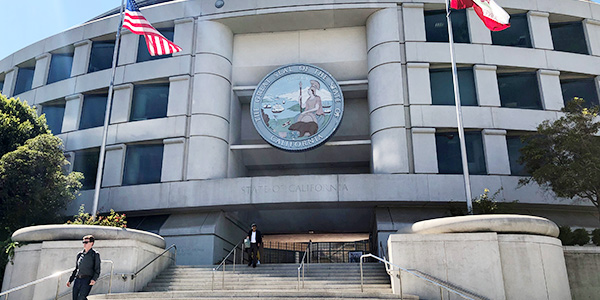By Hudson Sangree
The president of the California Public Utilities Commission called late Tuesday for escalating oversight and enforcement actions against Pacific Gas and Electric and said receivership may be necessary if the company can’t provide safe service once it exits bankruptcy.
“The receiver, if appointed by the superior court, would be empowered to control and operate PG&E’s business units in the public interest but not dispose of the operations, assets, business or PG&E stock,” President Marybel Batjer wrote in her proposed ruling.
Batjer is the commissioner assigned to the CPUC’s investigation of PG&E’s bankruptcy proceeding under Assembly Bill 1054, passed last July (I.19-09-016). The commission and the U.S. Bankruptcy Court must approve PG&E’s restructuring plan by June 30 for it to participate in the state wildfire insurance fund created by AB 1054.
The measure requires the CPUC to approve the utility’s reorganization plan including the “electrical corporation’s resulting governance structure as being acceptable in light of the electrical corporation’s safety history, criminal probation, recent financial condition and other factors deemed relevant by the commission.”
Batjer’s 10 proposals focus on operational and financial changes meant to enhance safety. Some were first proposed by PG&E in recent testimony.
To address ongoing concerns, PG&E suggested appointing an independent safety adviser after the tenure of its court-appointed monitor ends, a plan Batjer adopted as part of her proposals. The company has the monitor as part of its probation resulting from the 2010 San Bruno pipeline explosion. Jurors in federal court convicted PG&E in 2016 of six felonies related to that disaster. A series of catastrophic wildfires in recent years led the company to seek bankruptcy protection in January 2019.
In another proposal, Batjer echoed a prior demand by Gov. Gavin Newsom for changes in the leadership of the utility and its holding company. (See PG&E Tries to Appease Governor with New Plan.)
“At least 50% of the directors should be California residents at the time of their election,” Batjer wrote. “There should be the presumption that the reorganized PG&E and PG&E Corp. boards of directors will be comprised of individuals not currently serving on the boards.”
She also proposed tying executive compensation to safety performance.
The largest part of Batjer’s ruling describes a six-step process of correcting potential PG&E failures to comply with state law and regulations. Her outline starts with enhanced reporting by PG&E to the CPUC of its safety performance.
Continuing problems would be met with an escalation of government monitoring and control including enhanced commission oversight, appointment of a third-party monitor, appointment of a chief restructuring officer and finally the installation of a court-appointed receiver.
“If PG&E, or any utility, is perceived as struggling to deliver on its responsibilities to the point that the legislature tasks the CPUC with ensuring that the utility develops a governance structure that responds to its ‘safety history, criminal probation, recent financial condition and other factors,’ then it is the CPUC’s responsibility to identify and develop remedial measures,” Batjer said in her statement.
The CPUC is seeking stakeholder input on the proposals beginning at an evidentiary hearing Feb. 26 and continuing during hearings throughout March.
On Tuesday, PG&E reported multibillion-dollar losses but said it expects sustainable financial performance after it emerges from reorganization. (See related story, PG&E Reports $3.6 Billion Q4 Loss.)





